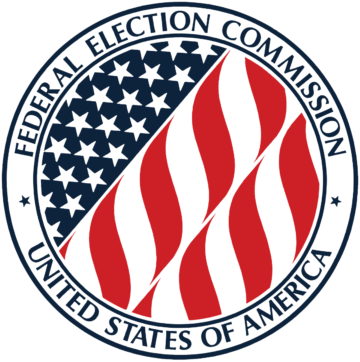Update (10/5): On October 4, the FEC provided guidance following U.S. District Court decision in CREW v. FEC. Read the FEC’s guidance here.
Update (9/19): As of September 19, the Federal Election Commission has not proposed or issued any interim guidance for groups making independent expenditures.
Update (9/18): On September 18, the Supreme Court vacated the stay of the district court ruling.
Update (9/17): On September 15, Supreme Court Chief Justice John Roberts issued a temporary stay of the district court ruling “pending further order.” The decision was set to take effect on September 17. The Supreme Court can now decide how to resolve the stay application. In the interim, the district court’s ruling will not affect groups making independent expenditures.
A recent federal district court ruling[1] threw out a long-standing Federal Election Commission (FEC) independent expenditure (IE) donor reporting rule. There are many unanswered questions about the impact and reach of the decision. Some of these questions raise very serious First Amendment concerns about associational and donor privacy.
The case stems from a 2012 complaint filed by Citizens for Responsibility and Ethics in Washington (CREW) against Crossroads GPS, a 501(c)(4) group. CREW alleged that Crossroads GPS had not disclosed donors as required by law. After the FEC dismissed the complaint, CREW filed a lawsuit against the FEC. Federal campaign finance laws allow complainants, such as CREW, to sue the FEC in court under some circumstances, if they believe the FEC violated the law by dismissing a complaint.
Advocacy groups that plan to make independent expenditures before the 2018 election face serious privacy, operational, and legal risks from the decision. It is unclear whether definitive answers will emerge in the remaining days in the 2018 election cycle.
We expect there will be an appeal of the decision and a request for a stay, which asks the court to put the ruling on hold until a later time. But it is unclear whether the appeals court will permit an appeal to go forward immediately, or at all. If there is a stay of the decision, the court could provide temporary relief from this uncertainty through the election.
The case centers on a dispute about a 37-year old FEC regulation that governs donor disclosure for groups that are not political committees (PACs), but make independent expenditures. The law requires IE reports to be filed by these advocacy groups within 24 or 48 hours of a regulated communication. They must also file a quarterly report. The regulation requires disclosure of donors who have contributed “for the purpose of furthering the reported independent expenditure.” In other words, groups must report only donors who intend their donations to be used for “the independent expenditure” listed on the IE report form. But the regulation is arguably different from the statute,[2] which requires donor reporting for persons donating “for the purpose of furthering an independent expenditure.” In addition, the statute also is read by some (including CREW and the district court) as requiring an IE speaker to report “information required [of a PAC] for all contributions received by such person.”[3] Whether this provision is meant to function as a separate reporting obligation is hotly disputed in the case.
The court declared the regulation invalid, saying that the FEC misinterpreted the statute and narrowed the reach of donor disclosure. The judge stayed her ruling for 45 days to provide the FEC some time to produce an interim regulation consistent with her holding.
It is not clear if the invalidated regulation provides any real protection and guidance to would-be speakers during this 45-day stay period that ends in mid-September. The regulation technically still exists during this time. However, groups must be aware of two concerns. Making an IE communication triggers two reports. The first is a 24-hour or 48-hour report. The second is a quarterly report. By the time the next quarterly report is due for a communication made during this 45-day window, the regulation won’t exist. Also, Judge Howell ruled that the dismissal of the complaint, based on the regulation, was “contrary to law.” She ordered the FEC to reconsider the complaint without applying the invalid regulation. So there is a danger that future complaints will be filed for activity technically occurring during the 45-day stay, and that a court will order such complaints to go forward.
When it takes full effect after September 17th, the ruling will require disclosure of all donors who give over $200 to support any independent expenditure for a particular candidate, instead of those giving only for the reported IE communications. In addition, the ruling requires disclosure of all donors who, during a calendar year, give the reporting entity more than $200 in “contributions,” which Judge Beryl A. Howell defined vaguely as funds “earmarked for political purposes.”
First Amendment Concerns
First Amendment concerns arise from unanswered questions about the reach of donor disclosure following Judge Howell’s decision.
One thing is clear from the court’s ruling in the case. Even in the court’s broad reading of the statute, the law does not require disclosure of every donor giving to an organization just because that organization makes an IE. The judge wrote that CREW’s assertion that all donors giving more than $200 must be reported was an “erroneous view of the scope of” the law because “only those donors contributing over that threshold amount for political purposes to influence any federal election are covered.”
The ruling says groups must disclose these donors:
-
- Those who give for an IE supporting or opposing one or more identified candidate.
- Those who donate to an advocacy group “for political purposes.”
Although the judge borrows the definition of a “contribution” as funds “earmarked for political purposes” from the Supreme Court’s ruling in Buckley v. Valeo, that phrase is still quite vague and potentially overbroad – a point noted in a later decision by the U.S. Court of Appeals for the Second Circuit.[4] In FEC v. Survival Education Fund, that court said “we must give content to the phrase ‘earmarked for political purposes’ which is used but not explained in Buckley. As defendants point out, [they] rely on contributions as the lifeblood of their issue-advocacy activities. Because these groups in some sense use all contributions ‘for political purposes,’ they contend that they will be at a loss to know when a solicitation triggers [the law’s] disclosure requirements and subjects them to potential civil penalties…. Accordingly, disclosure is only required … for solicitations of contributions that are earmarked for activities or ‘communications that expressly advocate the election or defeat of a clearly identified candidate.’”
Unfortunately, unlike the Survival decision, Judge Howell did not give any guidance concerning which contributions are “earmarked for political purposes.” She instructed the FEC to provide that guidance, but this is unlikely to happen soon. So groups that continue to make IEs may not be able to determine which of their donors they must disclose under the CREW decision. Some may feel compelled to report more donors than is warranted. Also, groups may be forced to report donors who had no reasonable expectation when donating that they would be publicly identified.
Even assuming, for argument’s sake, that the CREW decision correctly interpreted the statute, the FEC would have to navigate these confusing waters and provide the clarity required by the First Amendment. The best way to do that is by writing a new regulation, although the Commission could also issue less formal guidance documents or new instructions for its IE reporting forms.
Unfortunately, a new regulation appears unlikely. It takes the votes of four commissioners to adopt a new regulation. Today, there are two vacancies at the FEC, leaving four commissioners. Given the varying views among these four, including their sharp disagreements concerning the First Amendment vagueness problems posed by the statute, it’s unlikely the Commission will come to a unanimous agreement on a new regulation. A new regulation is not required, and if the four can’t agree, the FEC will instead let the vague statute and complex CREW ruling speak for themselves. That will not provide potential speakers with concrete guidance and will leave them at the mercy of politically-motivated complaints.
It is not clear what activities by an advocacy group might be considered “for political purposes.” Yet if a donor gives money “earmarked for political purposes” to an advocacy group that has made an IE, the ruling indicates that donor must appear on the FEC IE reports. Complainants or a judge might say the law requires donor identification for donations supporting the following activities:
-
- Ad campaigns lobbying members of Congress to vote for or against a specific bill. Ads that praise or criticize a lawmaker’s position pose higher risks.
- Public opinion polling.
- Scorecards of congressional votes.
- Candidate surveys or pledge campaigns.
- Electioneering communications.
- Praising or criticizing a candidate for taking a stand on an issue.
- Generic campaign activity, such as efforts urging people to vote Democratic, vote for gun control, vote to protect gun rights, vote for choice, vote for life, etc.
- Administrative expenses in reporting IEs.
- Certain types of voter registration, voter turnout, and get out the vote efforts.
- Many other activities by advocacy groups, such as speech critical or supportive of government policies. Speech on policies closely associated with a candidate or party, such as “Obamacare” or “tax cuts,” poses higher risks. Interviews with or quotes from candidates analyzing or discussing public affairs and policies, or promoting books about political topics may be at risk too.
No doubt some risk-taking speakers may decide to speak anyway, reasonably believing the FEC will follow the Survival court’s interpretation and not force unprecedented disclosure. But that could turn out to be a bad or very expensive bet. The Survival court’s precedent does not bind judges sitting outside the Second Circuit – like Judge Howell, or the judges of the U.S. Court of Appeals for the D.C. Circuit, where any future case would likely be heard.
As noted earlier, the federal campaign finance law allows for private enforcement of the law under certain circumstances. A person filing the complaint can sue the FEC if he disagrees with the dismissal of the complaint. So, even if a group believes the FEC would not force more disclosure, the agency does not have the final say. The law even provides that, in certain circumstances after the FEC has dismissed a complaint on remand from the court, the complainant can file a lawsuit directly against the target of the complaint. Such delegation of enforcement authority has only happened once, although this lawsuit is still in its early stages. Given the uncertainty around this statute, it could happen again.
Conclusion
So the immediate problem is determining how IE speakers can speak without risk. Groups and donors need assurance that the FEC or the court won’t retroactively order disclosure of more donors. If speakers can’t rely on regulations as written, that chills speech. Additionally, it’s unfair to change rules about political speech in the middle of a campaign, and many organizations have already run IEs during the current campaign.
In short, any IE speaker who speaks at any time between now and the election has no reliable guidance on which donors must be disclosed. If they guess wrong, there is a good chance a group will file a complaint. That could lead to the group finding itself sued in court by a political opponent or organization hostile to free speech, press, and associational rights.
While only a district court ruling in an ongoing case, the CREW decision has upended settled rules governing the rights of independent speakers. And it comes near the end of an election cycle, when many speakers have already made decisions relying on current rules.
The Institute for Free Speech is concerned that the decision may not receive the attention it deserves or, more troublingly, be read broadly to chill independent speech. We will continue to monitor developments and look for opportunities to restore robust First Amendment-friendly protections for independent speakers.
[1] The case is Citizens for Responsibility and Ethics in Washington v. Federal Election Commission, which was before Chief Judge Beryl A. Howell of the U.S. District Court for the District of Columbia. Crossroads Grassroots Policy Strategies, a 501(c)(4), is an intervenor defendant. A copy of the August 3, 2018 decision can be read here.
[2] 52 U.S.C. §30104(c).
[3] Such information includes the name and address of all contributors who give a total of more than $200 during a calendar year. A group would also have to make “best efforts” to obtain the occupation and employer of each donor.
[4] The statutory IE reporting requirement was also amended in 1979, and Buckley’s “contribution” definition therefore addressed a reporting regime that was different from the reporting regime at issue in this case.














